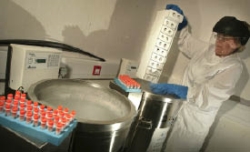Patrick proposes public funding for embryonic stem-cell reseach
BOSTON -- Despite profound objections to lethal experiments on human embryos, Gov. Deval Patrick wants taxpayers to fund what he envisions as the nation’s largest embryonic stem-cell research bank.
On July 19 he filed a bill asking the Legislature to approve spending $1 billion over the next 10 years on his Massachusetts Life Sciences Initiative. Part of the plan would give scientists in the private sector public financing to create and then destroy embryos for “humanitarian” purposes.
The bill would authorize borrowing $500 million -- half the total amount -- by issuing bonds for capital investments, including a gene research center and stem-cell bank at the University of Massachusetts Medical School in Worcester.
UMass President Jack Wilson lauded the plan in May when Patrick unveiled it at a biotech conference. Referring to the stem-cell bank, Wilson said, “It’s almost a lending library,” the Boston Globe reported.
Worcester Bishop Robert McManus issued a statement calling the destructive research method “reprehensible.” All four Massachusetts Catholic bishops in April had urged Patrick not to go this route but rather to encourage ethical stem-cell research.
“Destroying human life is never humanitarian,” they warned.
However, in press reports the governor brushed off objections as “ideological politics.” He did not respond to the bishops’ concerns, according to Massachusetts Catholic Conference spokesman Edward Saunders.
At the July Statehouse presentation, Patrick pitched his proposal as an economic boon. In addition to borrowing the first $500 million, the plan would commit the state to spend the other $500 million over the next decade from yearly budgets by awarding research grants and tax credits to biotech companies.
To questions suggesting that this and other spending plans he proposed in August were exorbitant, the Boston Herald reported that Patrick replied, “If I walked on water, critics would say, ‘You know, he can’t swim. What’s wrong with him?’”
Meanwhile, some investors have apparently realized that vague promises of embryonic stem-cell research are coming up short.
Missouri lawmakers recently stripped $150 million in public funding for it. In June, a Kansas City facility halted its $300 million project, according to The Washington Post.
In July, North Carolina lawmakers voted to legalize the destructive technique but voted down taxpayers’ subsidizing it. Across the globe, another leading research firm based in Singapore -- ES Cell International -- announced that it, too, was closing.
“It’s clear that some investors are exercising caution about stepping into the midst of what has certainly become an ethical minefield,” a prominent bioethicist told ZENIT news service.
Father Tadeusz Pacholczyk, director of the U.S. Catholic Bioethics Center, also noted that Catholics have been falsely labeled as being against all stem-cell research.
In fact, the bishops had urged research from umbilical cord blood, placental tissue and adult stem cells. But they said, “The use of public funding for unethical research that has not produced a single clinical benefit is a misuse of public monies.”
“The reason there’s such a fierce effort for public funding of embryonic stem-cell research is that private investors look at research results and say this is a very uncertain investment,” said Richard Doerflinger, deputy director of the Secretariat for Pro-Life Activities of the U.S. Conference of Catholic Bishops.
Doerflinger explained, “Patenting is an important factor. In adult stem-cell treatment, there is nothing to patent and sell if you use the patient’s own cells. Some say embryonic stem cells would be easier to patent. There will be future efforts to change the laws to patent human embryos.
“If you can make a tailored stem-cell line you can patent that and make everyone else who does the research pay you to use them. For example, what if you created the Ronald Reagan embryo, cloned from his cells, to be used in Alzheimer’s research?” he asked.
Patrick will need Massachusetts lawmakers to approve the bond bills to fund his plan. House Speaker Sal DiMasi has reportedly set up a Biotechnology Caucus to push this through.
In May, Rep. Elizabeth Poirier, R-North Attleboro, led an effort to dissuade Patrick from dismantling restrictions that prohibit clone-and-kill human embryo “farms” and safeguard women from being further exploited as “egg producers.”
In many cases, embryos used for stem-cell research are donated by clinics.
“The suggestion that we use ‘leftover’ embryos from fertility clinics because ‘they are going to be destroyed anyway’ is discrimination against a class of human beings -- the very young,” said Micheline Mathews-Roth, associate medical professor at Harvard Medical School, during a National Public Radio (NPR) special report on stem-cell funding.
Mathews-Roth, also a physician at Brigham & Women’s Hospital, was appointed by Gov. Mitt Romney to the Life Sciences Center Board. She could not be reached for comment, but the Globe reported that Patrick’s bill would overhaul this panel with his appointees; she and another member would be ousted.
She told NPR that embryonic stem-cell treatments have shown immunological rejection and produced tumors in patients. “People need to ask themselves,” the doctor said, “if they want to obtain benefit at the price of taking another human life, and also incur these potential risks.”
Cardinal Seán P. O’Malley, in a 2001 pastoral letter as then-bishop of Fall River, warned about the ethical implications of in vitro fertilization.
He explained that separating procreation from the sexual act leads down the slippery moral slope we now face. Eventually, he concluded, “Life will be valued and protected or manipulated and destroyed.”



















